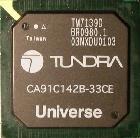|
Unzip and extract the archive with tar xzvf universeII-0.94.tar.gz
. This will create a directory with name universeII and a small
number of subdirectories. The complete installation instruction can be found
in the pdf documentation in the subdirectory doc or just click
here.
Driver:
Since the building of kernel modules significantly change from kernel
tree 2.4 to 2.6 there exist two subdirectories for the drivers.
One for the 2.4.x kernel universeII/driver-2.4 and one for the
2.6.x kernel tree universeII/driver-2.6. To compile the driver change
to the corresponding subdirectory and type make. The object code
(module) must then be inserted in the kernel with insmod universeII.o
or use the script ins. Note
that you have to be root to do this! To remove the driver type
rmmod universeII or ./uns. Before you can use the driver you
must create some devices under /dev. This is simply be done by
typing make devices.
If you upgrade from an earlier version than 0.93, delete the existing devices
with rm /dev/vme* and generate them again with make devices.
The reason for this additional task is the change of the vme driver device
number from 70 to 221 to be compliant with the linux device number scheme
A more elegant (and the prefered) way to load the driver is to use the
module loader. The module is loaded automatically when one of the
universeII devices is accessed. First add the following two lines to
/etc/modules.conf:
# Universe II VMEBus driver
alias char-major-221 universeII
Then copy the driver (universeII.o) to
/lib/modules/2.x.x/kernel/drivers/char
- where 2.x.x must be replaced by your actual kernel version - and
last step type:
depmod -a
The driver has been compiled without any problems using gcc versions up to
3.3.5 and was tested on different Linux distributions up to Suse
10.0 and Debian 3.0 versions.
It was used with kernel versions up to 2.4.27/2.6.15 and worked properly.
To check if the driver was successfully loaded have a look at
/var/log/messages and /proc/universeII.
Interface:
Before you can use the driver you have to compile the VMEBridge interface.
Just change to the directory vmelib and type make. This creates
the library libvmelib.a and libvmelib.so.0.9.3. To install the
shared lib on your system type make install
Test programs:
A good way to start is having a look at the test programs in directory
test. If you don't change the directory structure, all test files
should compile and link without problems.
Have fun.
|

